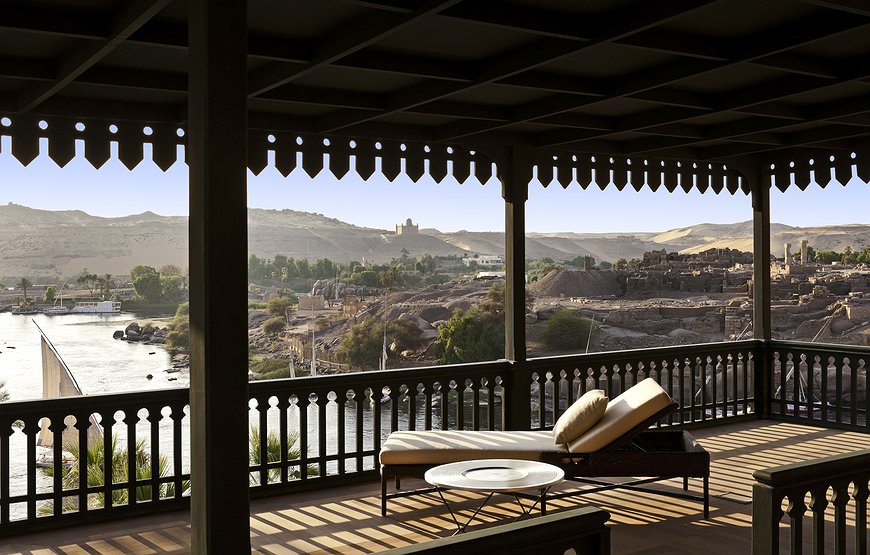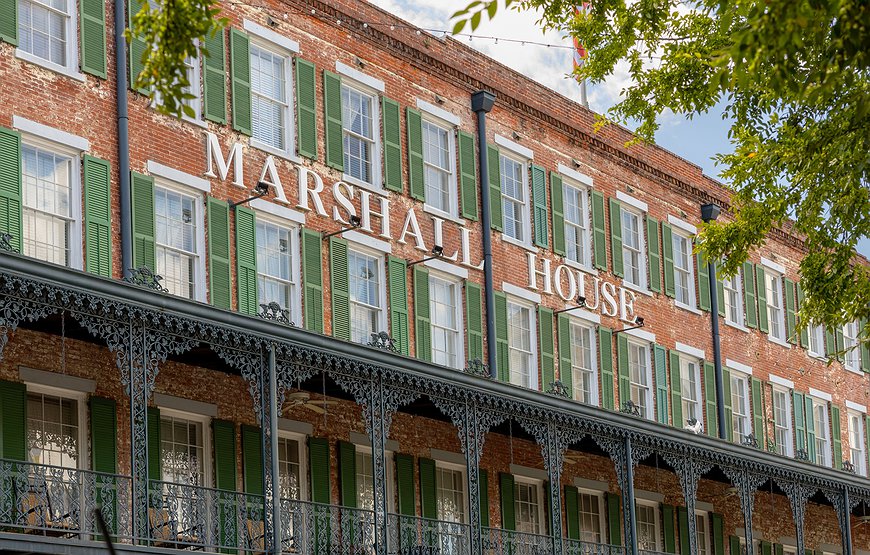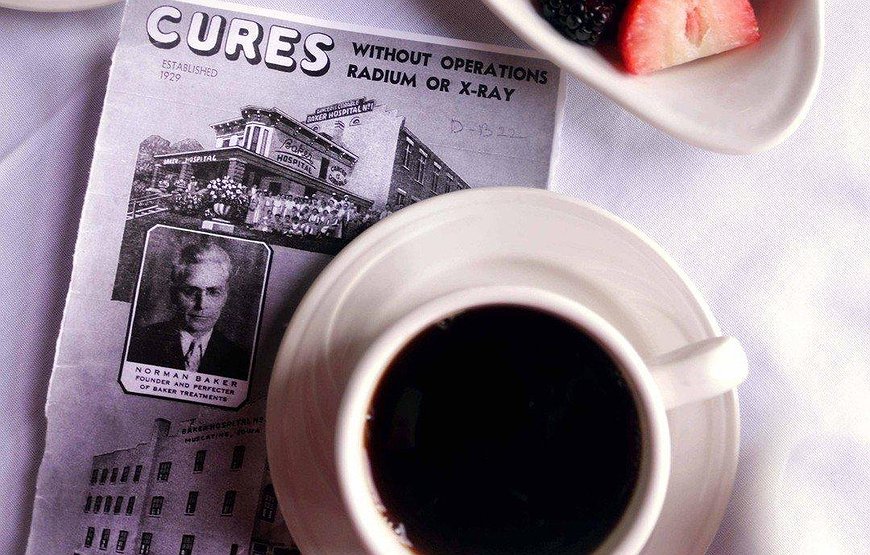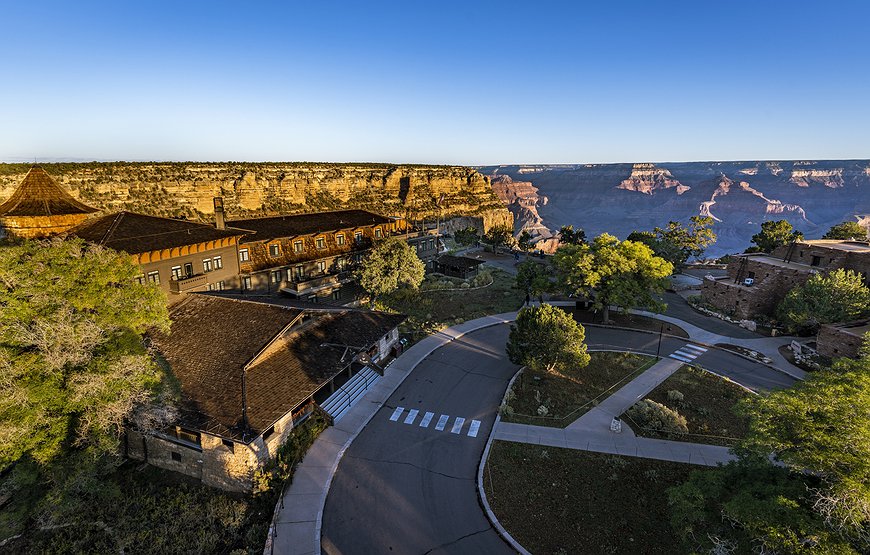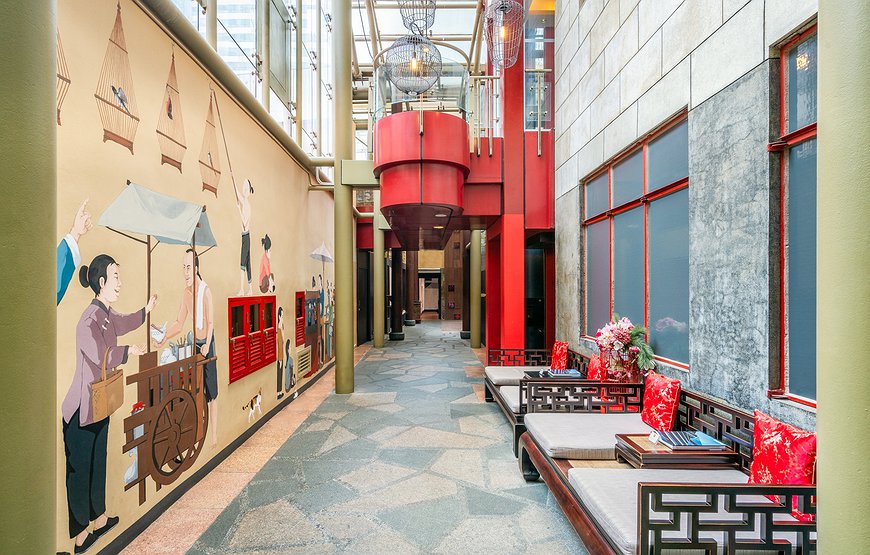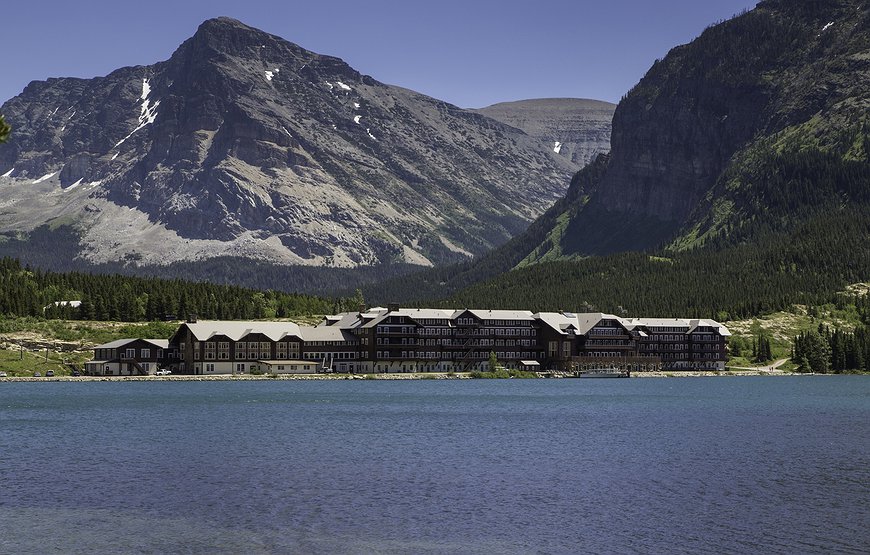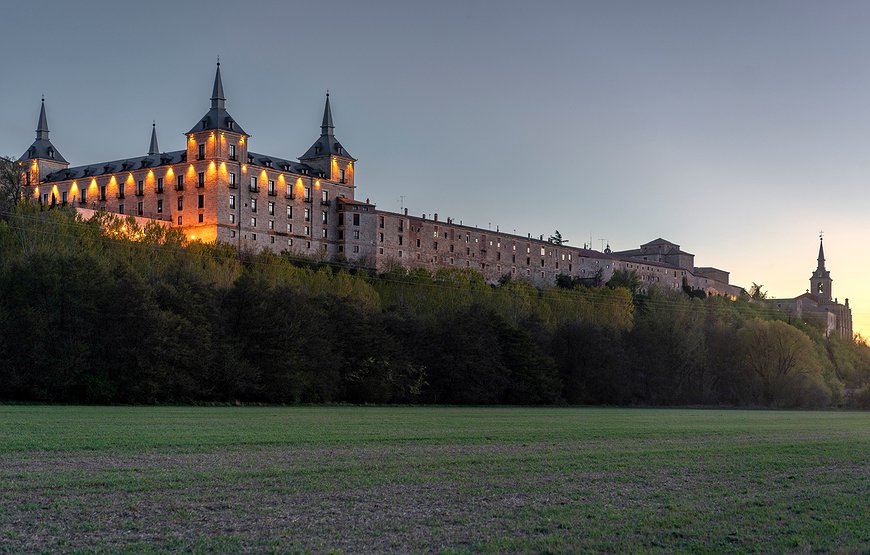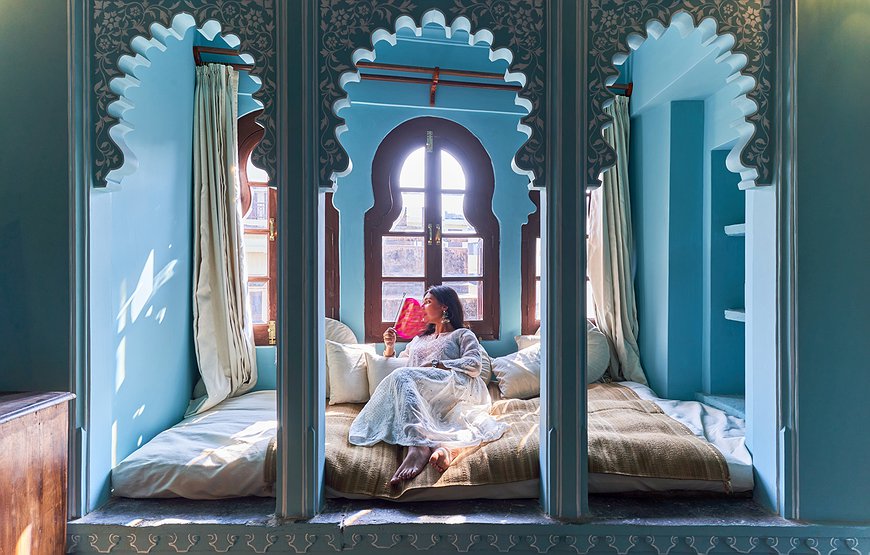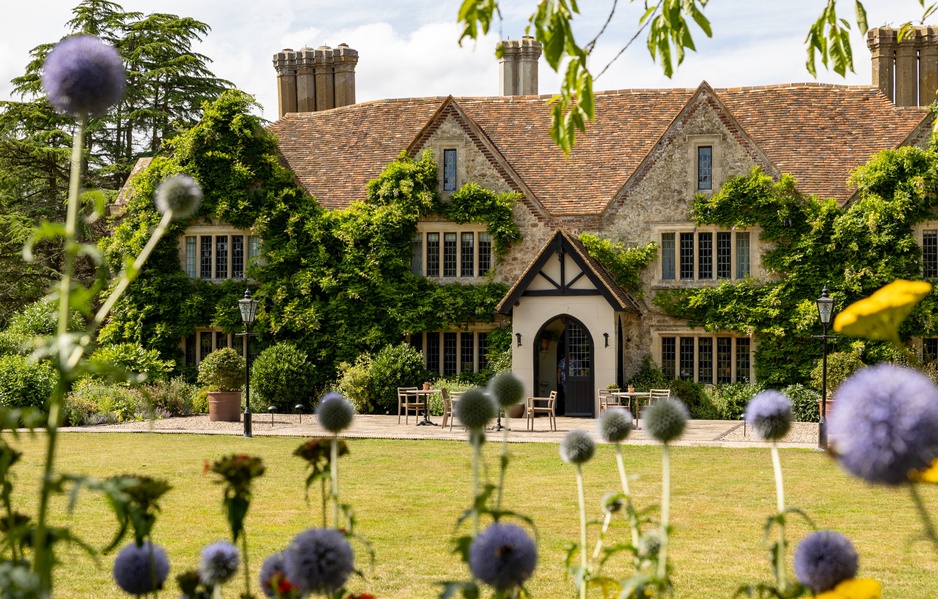
Picture this: a 17th-century manor house with secret tunnels in the cellar, a stash of gold coins hidden under the floorboards, and a king on the run from parliament once sleeping in your bed. Boys Hall, just outside Ashford, isn't your average countryside hotel. Brad and Kristie Lomas spent three years restoring this Grade II-listed Jacobean pile, and the result is nine bedrooms without TVs (gasp), a restaurant cooking over open flame, and enough historical intrigue to keep you entertained without scrolling through your phone.
The place is a 10-minute cab ride from Ashford International, making it stupidly easy to reach from London – 38 minutes on the fast train from St Pancras. But once you're here, surrounded by three acres of gardens and the scent of wisteria climbing the symmetrical gabled facade, the city feels wonderfully far away.
A House Built on Flood and Fortune
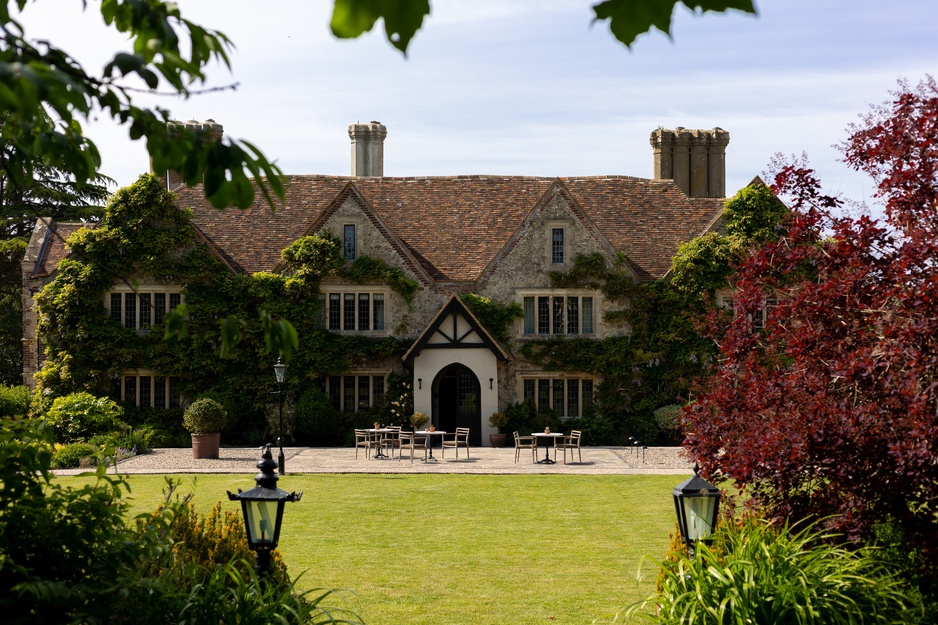
The story starts a quarter mile away at The Moat in Sevington, owned by the Convent of St. Augustine since Saxon times. After the Norman Conquest, the estate bounced around until it landed with the Boys family (originally De Bois from Normandy). When severe flooding hit, Thomas Boys said "enough" and built Boys Hall on higher ground in 1632, salvaging oak paneling and Jacobean doors from the old place.
The house saw its share of drama. John Boys, a Loyalist Cavalier who inherited the hall, supposedly sheltered Charles I when he was running from Oliver Cromwell's forces. The king reportedly thanked him with ornate paneling from Windsor Castle. By 1762, the house was leased to Lawrence Banks, who almost certainly used those cellar tunnels to smuggle wool out and alcohol in during the Napoleonic Wars. Legend says one tunnel led to Sevington Church, another toward the fields beyond.
Then there's the gold. In 1970, Mr. R. F. Farrance was doing repair work when he found 17 gold coins in a broken flowerpot under the floorboards – coins spanning Henry VIII to George I, declared treasure trove by the British Museum. The hoard was likely buried between 1725 and 1730, though no one knows exactly why.
Lounges: Where Creaky Floors Meet Comfort
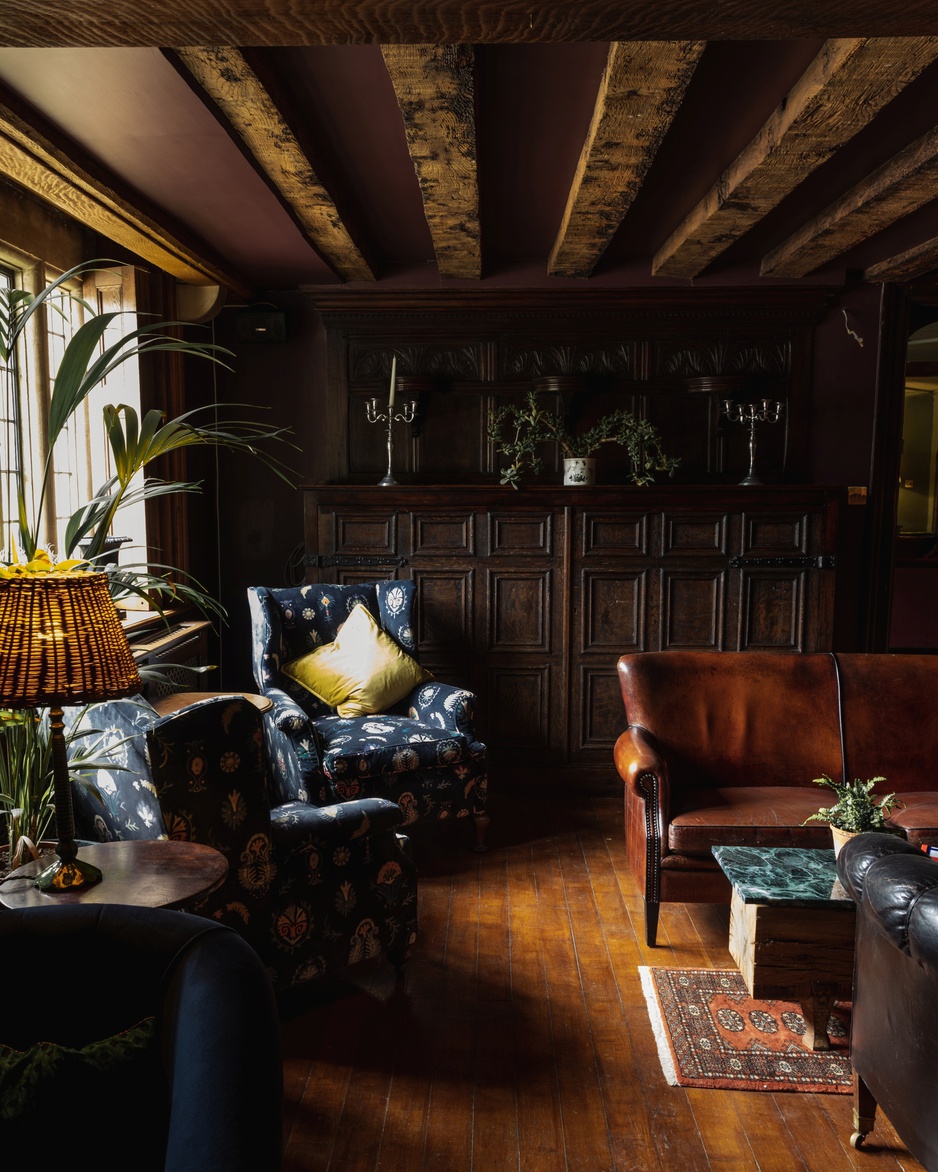
The entrance hall sets the tone: a tile-lined fireplace (lit when weather permits), two huge sofas that practically beg you to sink in, and a reassuringly creaky wooden staircase. To the left is a private dining room. To the right, more sofas, another fireplace, and stacks of games in the low-lit lounge. There's a signature scent diffused through every room, and vintage Roberts radios play chilled music throughout.
The lounges are where you'll find homemade cake on arrival, pots of tea, and excellent coffee from &Bloss, roasted less than three miles away. Books and magazines are scattered about. Dogs are welcome. It's the kind of space where you actually want to sit and read rather than retreat to your room.
The Pub: Guinness, Board Games, and a Smuggler's Legacy
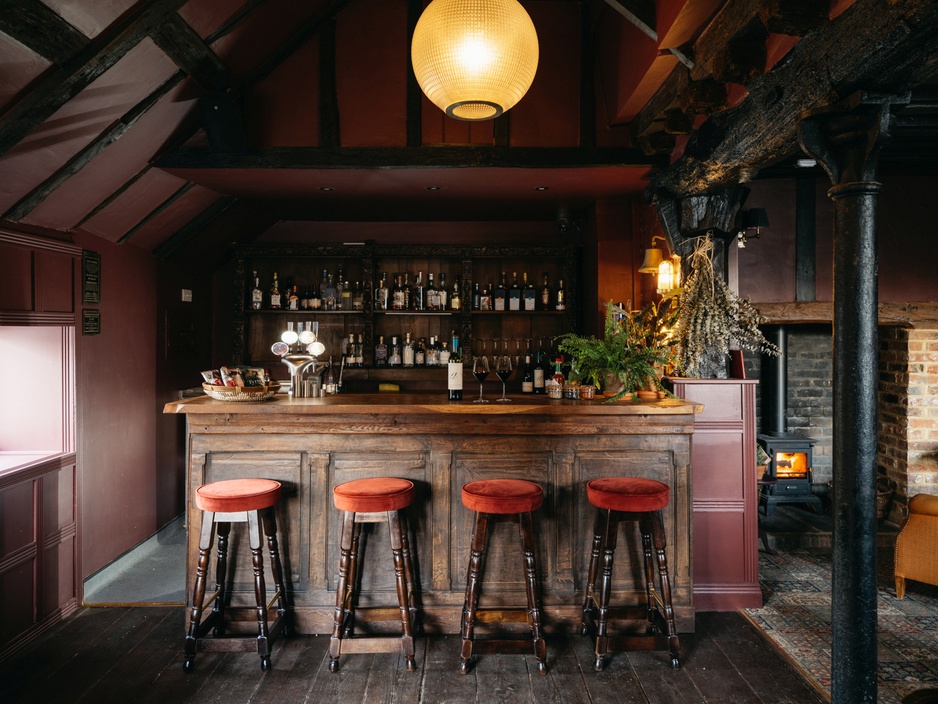
The pub occupies what was the original 1616 Wealden hall house, and it feels it – low ceilings, exposed beams, and a roaring fire. Guinness, cider, and beer are on tap. There's a bar menu of sandwiches on locally made sourdough (rare roast beef with 35-day aged BBQ beef, grilled halloumi with caper salsa), crispy duck wings with hoisin and sesame, and Beal's Farm charcuterie. Sometimes there's pie.
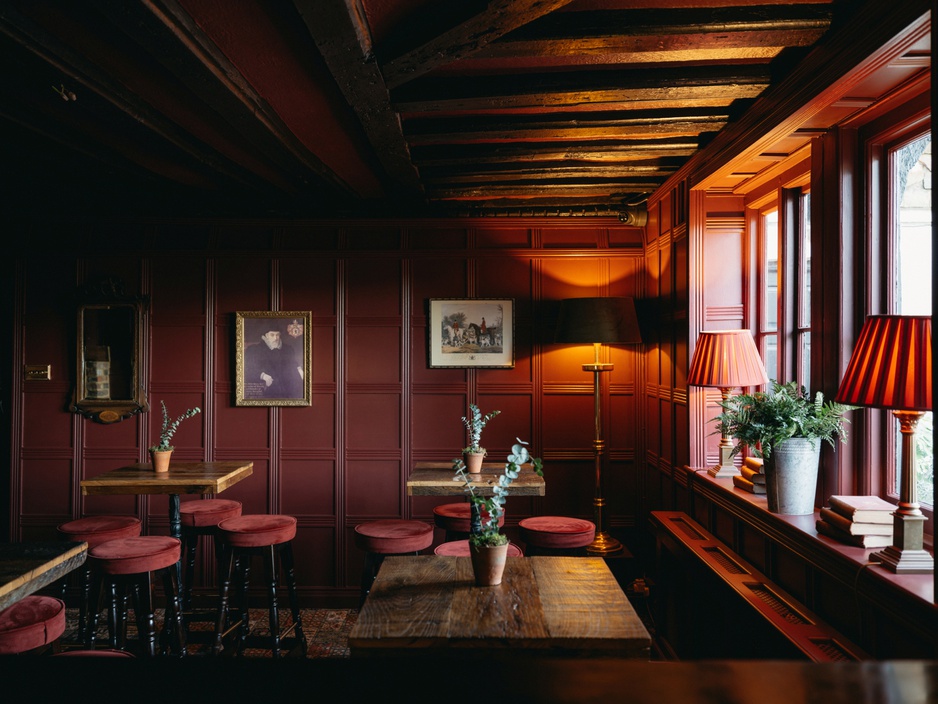
The courtyard out back seats 30 and is where the bar menu is served on warmer days. But the real draw is inside: cozy seating, board games, and the knowledge that smuggled goods likely passed through these very walls. Dogs are welcome here too.
The Restaurant: Fire, Kent, and Zero Waste
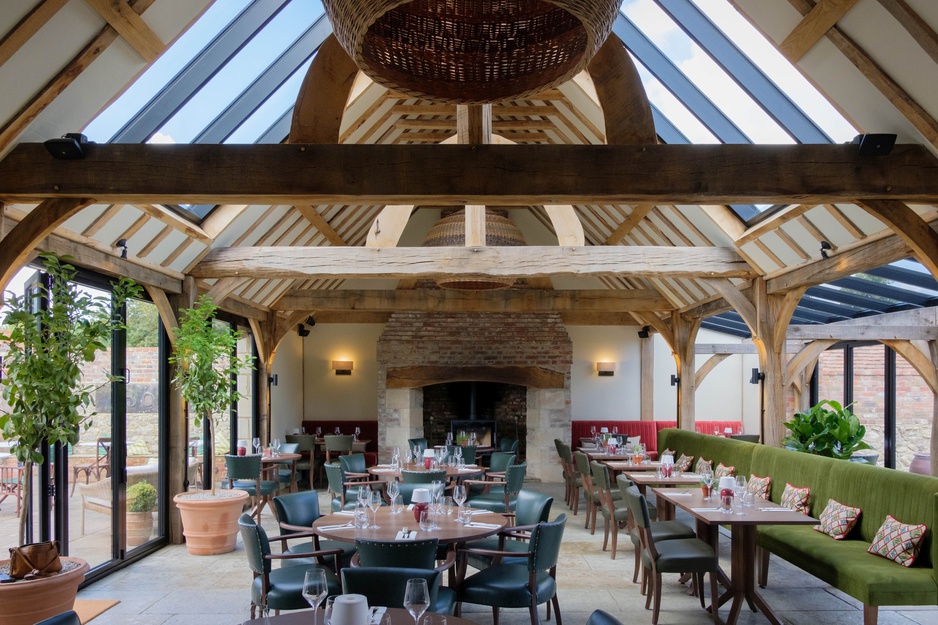
The restaurant is housed in a new glass-and-beam addition at the back of the house, constructed with local oak cut and shaped on site. Windows on both sides look out to walled gardens and terraces. The cooking centers on seasonal, local produce – seafood from Hastings, charcuterie from Beal's Farm near Tunbridge Wells, and Brad's own sparkling wine, Penstock, made in Canterbury.
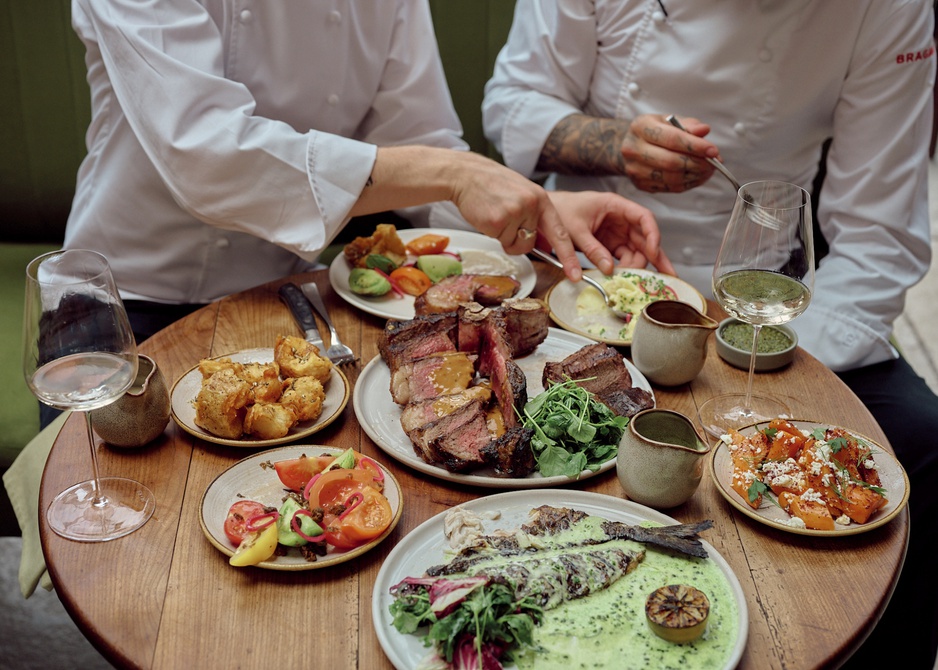
Much of the menu is cooked over fire and coal using an Asado-style grill. Starters might be Kentish cider mussels, followed by fire-cooked sea bream or 30-day aged steak. The kitchen runs a zero-waste operation wherever possible, returning collected waste to farm suppliers (all within a 20-mile radius). Flavors are front and center, the cooking sophisticated without fuss. Service is relaxed but polished, with warm and knowledgeable staff, many of them local.
Breakfast includes homemade granola, sourdough toast, pastries, fresh fruit, and Boys Hall honey. The shakshuka is worth paying extra for. Continental breakfast is included in room rates.
The Rooms: No TVs, Just History
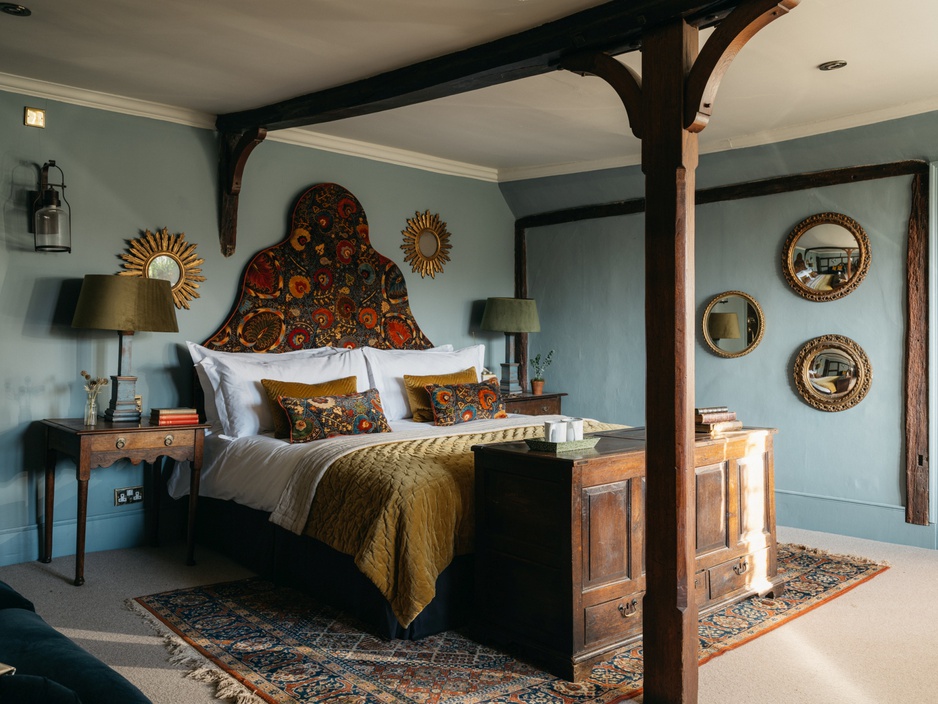
Ernest
All nine bedrooms are named for local and historic connections, each with super-king beds (some four-posters), pure cotton bedlinen, fluffy towels, and Pelegrims toiletries made in Kent. There are Kent Crisps in the honesty bar on the landing. Tea and coffee are complimentary. Roberts radios replace TVs. Earplugs are provided (17th-century walls aren't known for soundproofing), along with a flask of Kentish apple brandy to help you nod off.
Ernest
Named for Major Ernest Bengough Ricketts, who bought the house in the late 1800s for his beloved Catherine Hoskins-Master. He was a military man, painter, and illustrator who left behind a beautifully detailed bookplate depicting Boys Hall. This spacious room features original hall-house beams, a luxurious window-framed bathtub, a comfy velvet sofa, and antique mirrors. The super-king bed converts to twin if needed. There's a drench shower and a roll-top bath in the room.
Romney
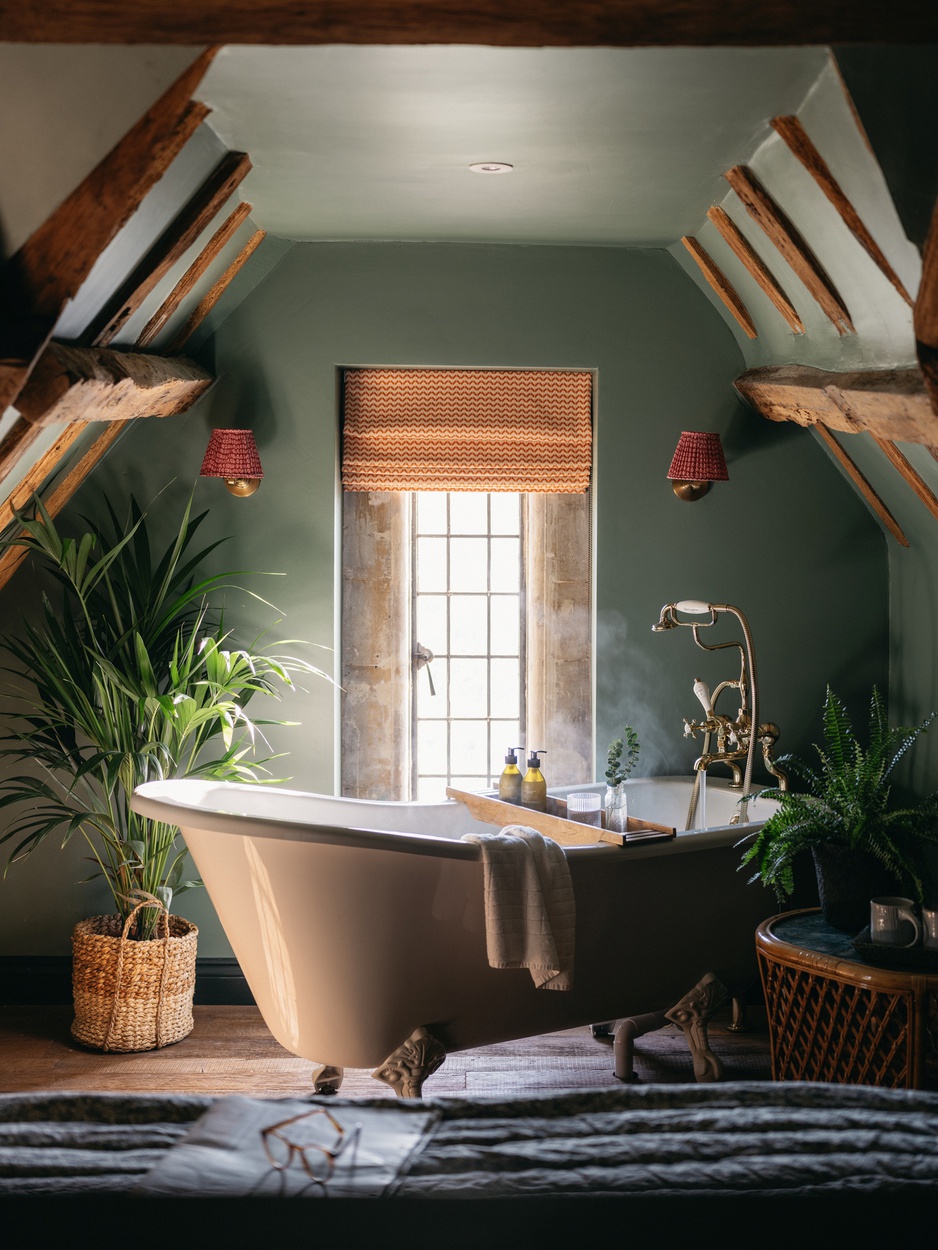
Romney
This is one of the super-suites, reached via its own miniature staircase up in the eaves. The room is named for nearby Romney Marsh, birthplace of smuggling in southern England. A secret hatch and pulley system was found in this very room, leading down to the remains of two tunnels in the cellar. Oak beams fill the lofty, open space. A roll-top bath sits center stage in front of the original stone mullion window, perfect for a soak with a bird's eye view of the garden. The sage-and-umber color scheme adds to the calm, making it ideal for light sleepers who want to be away from the action below.
Bishop's Quarter
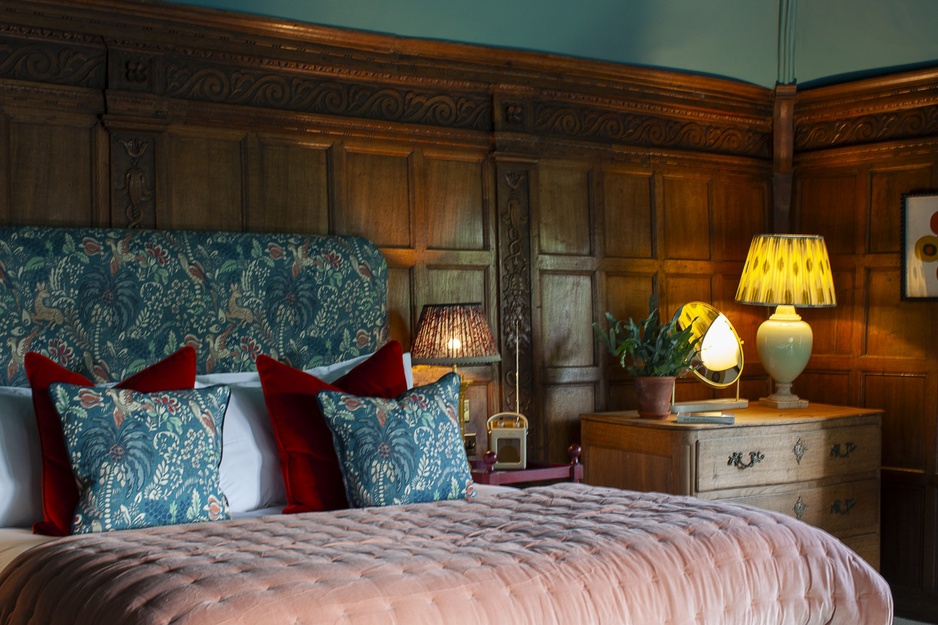
Bishop's Quarter
The other super-suite and an absolute must-stay. This enormous space features original 16th-century paneling and stone mullion windows with garden views. Below the original domed ceiling, you'll find a walk-in drench shower, a heavenly bathtub, and your own bottle of brandy. The ornate paneling in the fireplace was reportedly a gift from Charles I, formerly installed in Windsor Castle, given in thanks for shelter during his flight from parliamentary forces. The super-king bed sits on a small step-up plinth to keep it level on the wonky floor.
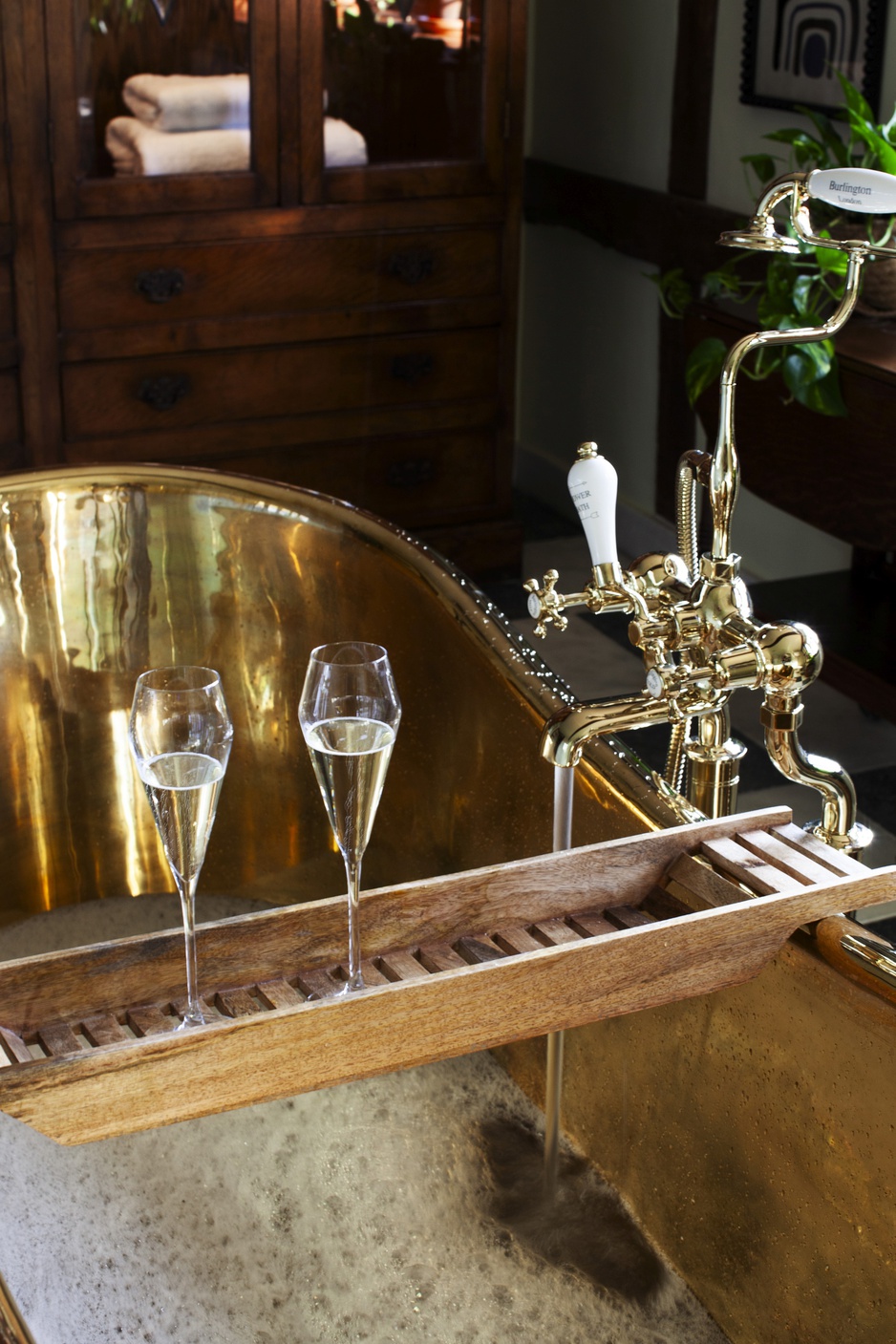
The bathroom is bedroom-sized with a checkerboard marble floor and one of the hotel's large freestanding baths.
The Garden: Wild Flowers and Lawn Games
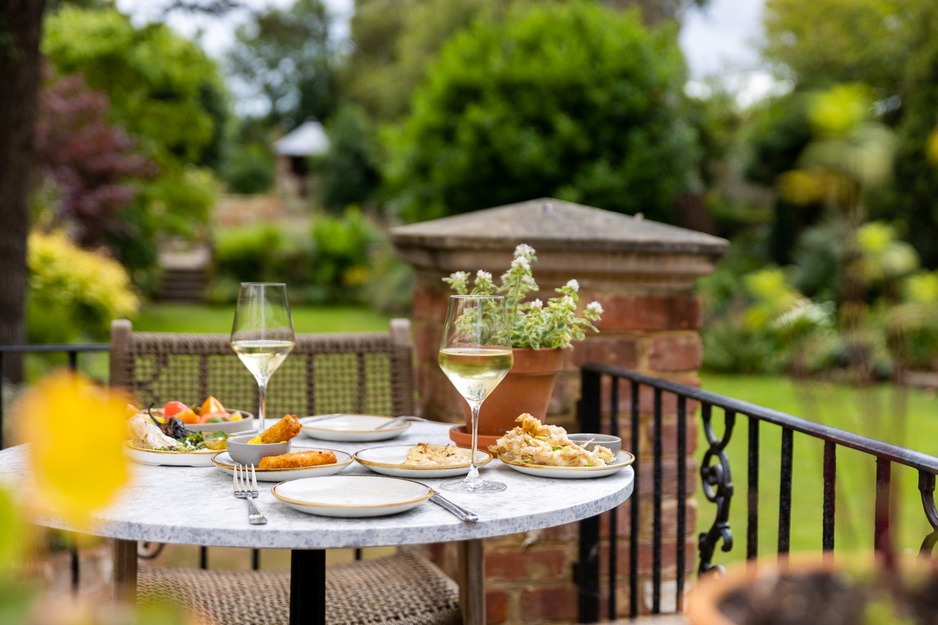
Three acres of grounds surround the house, planted with wild flowers to encourage biodiversity. The restaurant terrace seats 50 and serves the full restaurant menu. Wander through the rose garden, find a garden chair, or head to the arbor for lawn games. The gardens were designed to be sympathetic to tree roots, and the hotel participates in a scheme replanting native Kentish trees in the surrounding area.
You're well positioned for excursions – vineyards, the south Kent coast, walks through the countryside. But public transport from the village is limited, so you'll need a car. Or just stay put and enjoy the sounds, scents, and unmistakable style of a house that's seen kings, smugglers, and now, finally, you.
Boys Hall Rd, Willesborough, Ashford TN24 0LA, United Kingdom

